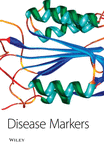Utility of the Blood for Gene Expression Profiling and Biomarker Discovery in Chronic Fatigue Syndrome
Abstract
Chronic fatigue syndrome (CFS) is a debilitating illness lacking consistent anatomic lesions and eluding conventional laboratory diagnosis. Demonstration of the utility of the blood for gene expression profiling and biomarker discovery would have implications into the pathophysiology of CFS. The objective of this study was to determine if gene expression profiles of peripheral blood mononuclear cells (PMBCs) could distinguish between subjects with CFS and healthy controls. Total RNA from PBMCs of five CFS cases and seventeen controls was labeled and hybridized to 1764 genes on filter arrays. Gene intensity values were analyzed by various classification algorithms and nonparametric statistical methods. The classification algorithms grouped the majority of the CFS cases together, and distinguished them from the healthy controls. Eight genes were differentially expressed in both an age-matched case-control analysis and when comparing all CFS cases to all controls. Several of the diffrentially expressed genes are associated with immunologic functions (e.g., CMRF35 antigen, IL-8, HD protein) and implicate immune dysfunction in the pathophysiology of CFS. These results successfully demonstrate the utility of the blood for gene expression profiling to distinguish subjects with CFS from healthy controls and for identifying genes that could serve as CFS biomarkers.




